Introduction
[00:00:00] Detective Ev: Hello everyone. Welcome back to another episode of the Health Detective Podcast. My name is Evan Transue. I will be your host today for today’s show on chronic hives.
We interview people on this show who have been through their own health journey. What we want are people who have done some very cool things health wise that many others think are impossible when they hear this. They can use this information to get better.
My guest today is Erica Duffy. I’m going to read her bio and we’ll jump into it. She is a Functional Diagnostic Nutrition practitioner, certified health coach, wife, and mom with a deep passion for empowering individuals to take charge of their wellbeing. Her own health struggles with breast implant illness, TMJ, and chronic hives, along with her husband’s multiple sclerosis diagnosis have led her to where she is today as an FDN.

Her mission revolves around helping people discover the path to optimal health and enabling them to embrace their true selves. Through her expertise with the use of functional labs and an extensive medical/lifestyle history, she guides individuals to understand their bodies, intensify underlying health issues, and make informed choices that lead to improve vitality and self-confidence.
Her business is centered on the belief that everyone can achieve a state of vibrant health and comfort in their own skin. And she takes pride in helping individuals not only feel better, but also gain the knowledge and tools to maintain lifelong health and happiness.
Well, Erica, welcome to the show.
Erica Duffy: Thank you.
Detective Ev: I’d love to dive into your story. That’s always how we start this stuff off. And then that leads to the science and nerdy part of all this stuff.
Chronic Hives: Symptoms Crashing In
What did your first health symptoms look like and when did they start? I know we touched on them in a more broad perspective in the bio. But when did these things start and what was the first one?
[00:01:50] Erica Duffy: They all started in 2016. Because prior to 2016, I didn’t really have any health issues. Maybe I got a common cold every year. I have four kids. Now they’re teens and tweens, but at one point they were little, always catching something.
But in 2016, I decided to get breast implants. It took me a year and a half to connect the dots and realize that the implants were causing the issues because then symptoms started coming. The next day I went for my post op, and I had a rash on my chest. She said, oh, it’s your body getting used to a foreign object, put some lotion on.
I just said, okay, and brushed it off. Then a couple of months later, I got some anxiety, and I’ve never experienced anxiety before. I went to immediate care because I thought something was seriously wrong. You know, I didn’t know what was going on. They said, all your vitals are fine. You’re fine. So, I just thought I was fine and went home.

Then I started getting heart palpitations in the middle of the night. I’d wake up and wouldn’t know what’s going on. My husband was like, what’s going on? My heart would be racing. So, I went to my doctor for that. She sent me to a cardiologist and the cardiologist had an echo done.
Chronic Hives: More Symptoms
The tech said, I could see most of your heart but your implant’s covering part of it; I don’t want to press too hard because I don’t want to rupture it so I’m just going to leave that part be. I thought, well, what if there’s something behind that, that you’re not seeing?
But the cardiologist didn’t see anything. She’s just said, okay, we’ll leave that be. They didn’t find any answers. I said, could this be my implants? She said, no. So, I said, okay. Then I just learned to live with it. You just don’t find an answer.
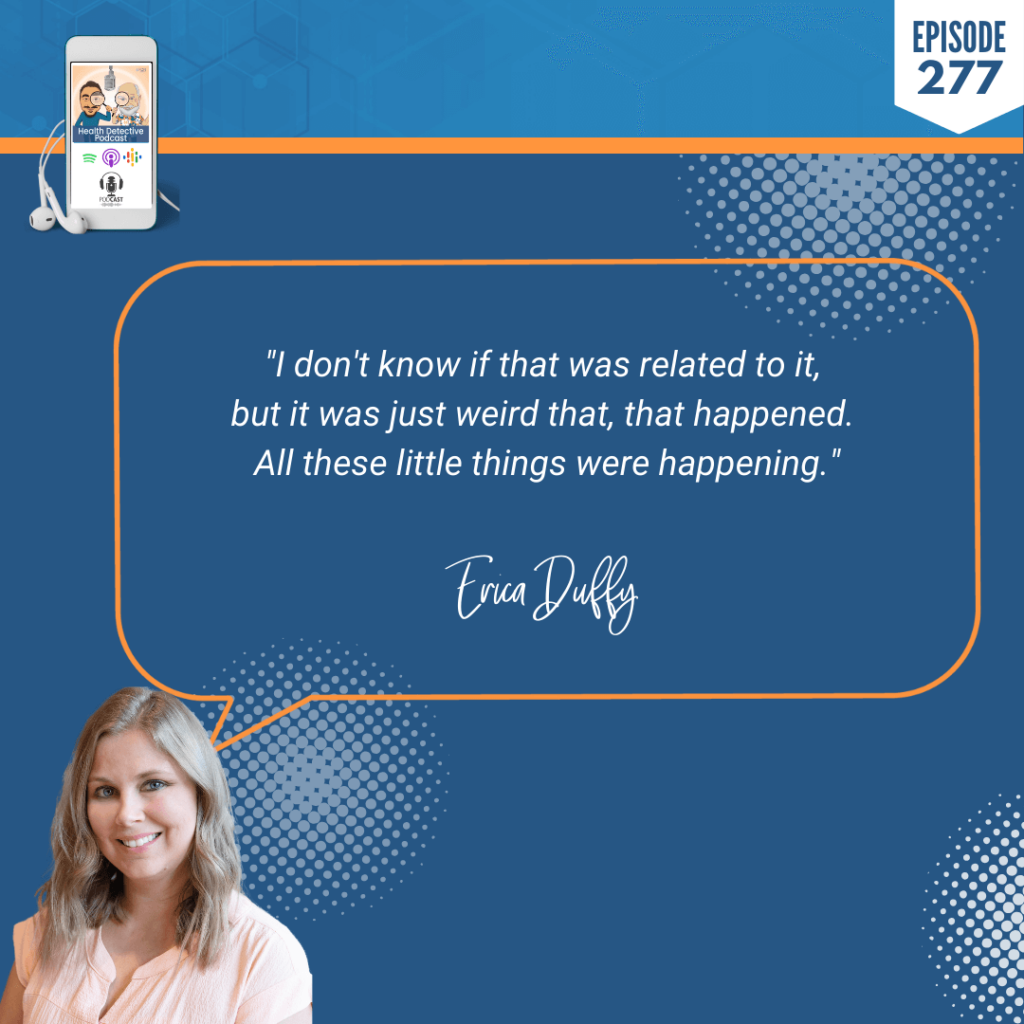
I would just wake up in the middle of night, it still was happening. And I would just calm down sooner and go back to bed. Then that year, I had bronchitis, pneumonia, the flu, all back-to-back. And I’ve never had any of those. I just couldn’t catch a break. So, I don’t know if that was related to it, but it was just weird that, that happened. All these little things were happening.
And then with TMJ with my jaw, all of a sudden, I couldn’t clench it anymore. It hurt so bad and was unaligned and so much inflammation. So, I went to an oral surgeon. This is where I started to dive into health and wellness a little bit because he said it’s inflamed; you’ll have to go on a liquid diet for eight weeks. That’s all he told me. He said, so go on a liquid diet. I said, what does that mean? He said, just drink liquids.
I thought this could be a long time, liquid diet for eight weeks, then another four weeks of soft chew. So, I had to really look into my nutrients and make sure I was getting everything I needed.
Chronic Hives: Researching Breast Implant Illness
I had lost weight, but I don’t recommend this to lose weight. It was medically necessary, but thankfully, I think I was getting what I needed.
Then that year I went to Las Vegas with my husband, and I was so cold. I could not regulate my body temperature; I just couldn’t get warm. We were outside Vegas in the heat. When we went back inside, I was under all the blankets. We turned on the heat in the hotel room, I could not get warm. And then I was just shivering and was really tired. That lasted probably only a few hours, but it was really strange.
That happened a few more times after I got home. That’s when I started looking up these symptoms. I thought this is really strange; I’ve never experienced even fatigue. Even with four kids, I was always pretty able to do what I have to do. I was never like bedridden. And I wouldn’t call it bedridden, but there were days where I couldn’t do anything.

So, breast implant illness came up and then immediately I knew. I was like, this is what’s happening. Everything started since I got them put in. I’m not telling people go get them taken out. Not everybody has issues with it. But if you’re having issues and you’re chasing symptoms, just look into that. That could be the reason why.
So, I made an appointment with my doctor to have them removed. But in between the appointment and like, when I realized setting the appointment, my husband started getting really bad neck pain. And he’s one who was just putting it off. He was studying for a big certification and wanted to take the test.
Chronic Hives: Managing MS with Lifestyle
The day he took the test, his arm went numb. Then he passed the test somehow and went to the ER. They did an MRI, and he had a herniated disc. So, that’s why his arm went numb because of the way it was pressing on his nerve, but they also said we see some lesions on your spine.
They said, we want to do a brain MRI, too. So, they did a brain MRI and it lit up; there were lesions. We weren’t sure what was going on. They came in the room talking to us as if we already knew. Then they said, here’s three pamphlets for medication. I’m like, what’s this for? And they said, oh, he has multiple sclerosis. Which is really strange because I heard it’s really hard to get a diagnosis for multiple sclerosis. It was opposite for him. He didn’t have any symptoms of it, but he had the lesions.
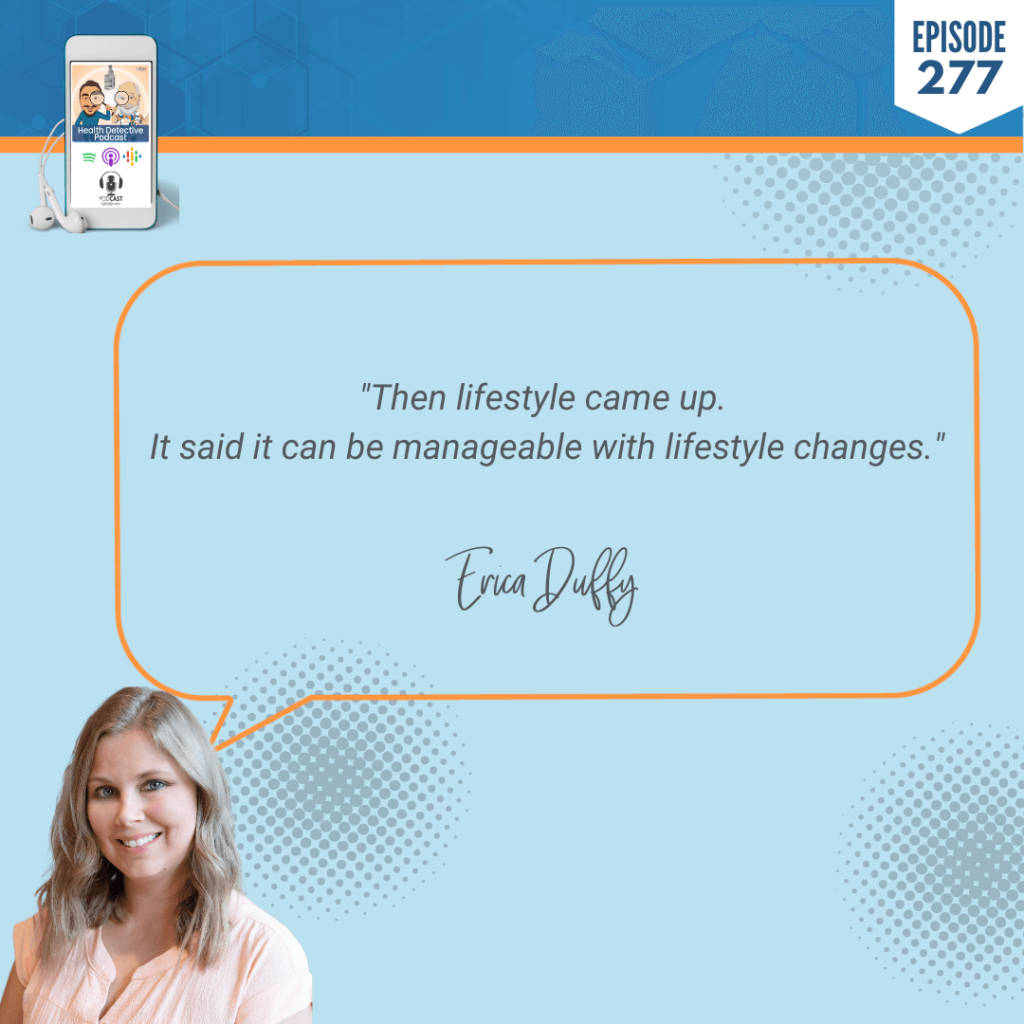
So, I went home that night. He was admitted to manage his pain because they couldn’t do surgery for a month. And I had every intention on picking a medicine. I looked at the pamphlets to look up each medicine and then, all of a sudden, side effects were coming up. Then lifestyle came up. It said it can be manageable with lifestyle changes.
So, I looked on to that and I brought it to him the next day. I said, this is what I found out on the medicine and about the lifestyle change. But it was ultimately his decision; it’s him who’s going to be doing it. He said, I’ll do whatever the lifestyle change.
Chronic Hives: Attempting Breast Implant Removal
So, I decided to go back to school to be a health coach. I thought maybe that will help and I’ll learn how to help you with these changes. We can make those changes at home.
So, I went to Dr. Sears first – Dr. Sears Wellness, and it was good. It was helpful, but it was more diet, shopping, ingredient labels. Then I decided to go back to school for my bachelor’s degree in health sciences with a concentration in healthy lifestyle coaching. I went to Arizona State University for that, learned a lot more about lifestyle.
All this time, he’s making the changes, doing great. Still no symptoms. To this day he’s had some flare ups. We’ve noticed stress, work could be stressful, or kids. He’ll know the next day, his legs might hurt. But all in all, he’s doing pretty well.
During this, I had to go on the back burner to get my implants out because he couldn’t work. He had the surgery, he couldn’t work for three months, couldn’t lift anything, couldn’t drive. I couldn’t have a surgery too and go through that, so I was just dealing with managing my symptoms, just dealing with them.
So, then the time came, and I decided to get them out. I saw my doctor and I was trying to get her to write a letter to cover it for insurance because it’s expensive to have them taken out. And I said, can you show that I’m having these medical issues I’ve never had. And she said let me test you for autoimmune.
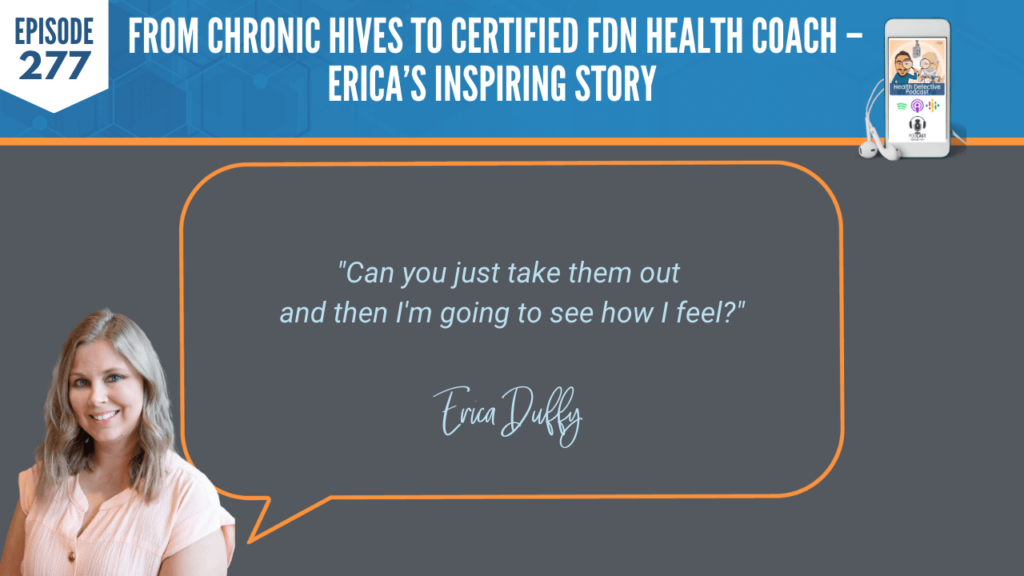
I was like, I want to wait on that, I don’t want that. I just didn’t want the diagnosis. Can you just take them out and then I’m going to see how I feel?
Chronic Hives: Everywhere, 24/7
So, I’ve always had eczema, that I did have ever since I was little. But I could manage it on my hands when it gets cold or if I get stressed, I might get some eczema on hands. And I know what to do to get rid of it. I had this patch that just wouldn’t go away. The next day after I got them out, it was gone, just gone. So, I told her everything. Everything stopped at that point. I’ve never had heart palpitations again, or the chill like the cold I was getting or the fatigue. I didn’t have any of that. That was in 2019.
And then my husband’s still doing well, and I graduated. I didn’t know what to do with my certificate. There was no business background in it. I just didn’t know what to do. So, I was a photographer for 10 years before that, self-employed, and I retired. You know, I got burnt out from that. And so, I was just in limbo, not really doing anything, just focusing on the kids and family.
Then last year I started to get a rash, like little hives. I’ve never gotten that before. So, then we were out of town in Las Vegas again. I would take like a Benadryl, which Benadryl makes me really tired, I hate taking it. But it would go away for a couple of days and it would come back. And it was only like a couple, like a little bit.
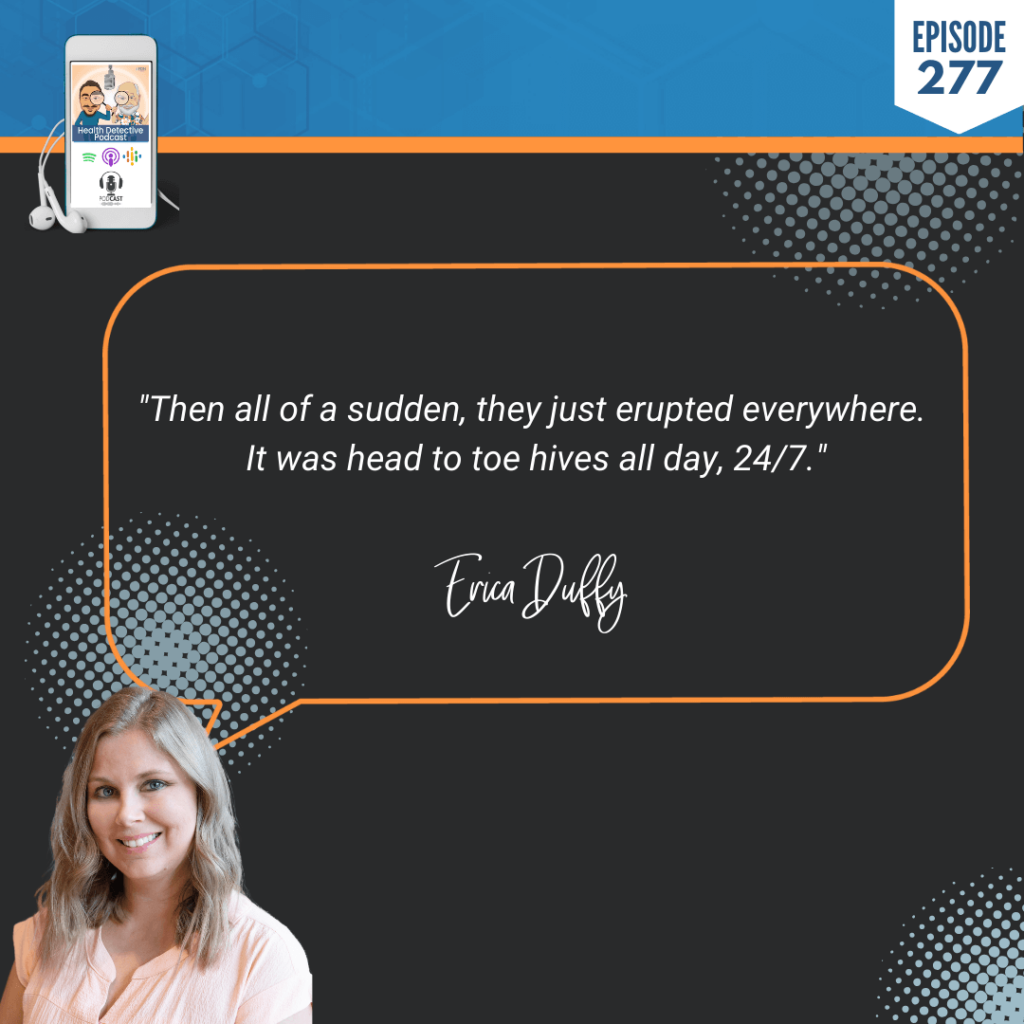
Then all of a sudden, they just erupted everywhere. It was head to toe hives all day, 24/7. An antihistamine wouldn’t even touch it. Nothing. It was all over. And I went to many doctors.
Chronic Hives: Steroids
One said it’s diagnosed chronic urticaria. He said, up your antihistamine and start taking Pepcid. So, I was trying everything. Then one day I did go to the ER because my lips were swelled up and I was afraid my throat was going to close. I had COVID at that time too. That might’ve made them worse, but I already had the hives. But I got COVID and then my lips swelled up.
I get it, in the ER, they don’t really want you there with COVID. So, he just checked my throat and said, you’re not in any danger and sent me home. He said, take the Pepcid too. I didn’t notice any difference; I was still taking it.
Then, I saw my general practitioner. He said, it’s environmental, figure out something at home. And I was like, I’ve been trying to figure this out. I’m not coming up with anything. Then another doctor said, these things happen, you just have to wait it out. It’s a flare up and it’ll go away. But I thought why is it happening though? My body’s trying to tell me something.
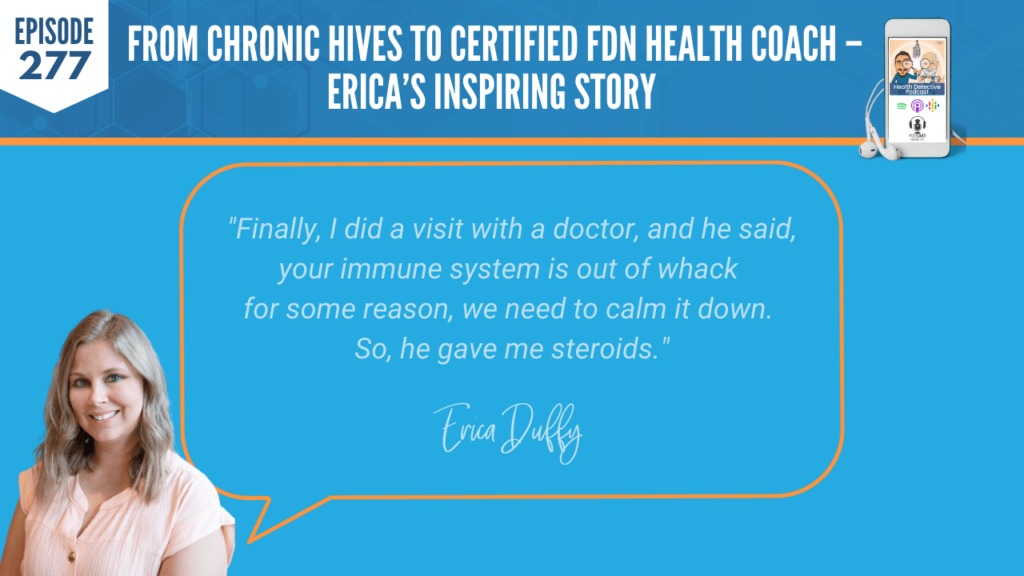
Finally, I did a visit with a doctor, and he said, your immune system is out of whack for some reason, we need to calm it down. So, he gave me steroids. At first, they didn’t work. The lady didn’t specify how to take it. I took it wrong, so they started burning. Like, the hives never burned, and it was just, my whole body was burning. They said, no, take it this way. So, I changed it and then they went away. I felt like me again because I’d been hiding out.
Chronic Hives: Anxiety
I couldn’t wear any makeup. It would make it worse. I couldn’t wear certain clothes too tight or too long. It would just feel funny. So, then I was able to go out, I was able to leave my house. And then towards the end of the dosage, it was Day 11 of 12 days. I was supposed to take Day 11 and I started feeling really weird. So, I thought my blood sugar was dropping.
I just felt really short tempered, just irritable. So, I went to the immediate care, and they said it’s a side effect of the steroid. And I said, of course it is. I thought, okay it worked. I finished it out the 12 days and then they came right back worse. The hives were right back. I didn’t even think they could get worse, then they were worse.
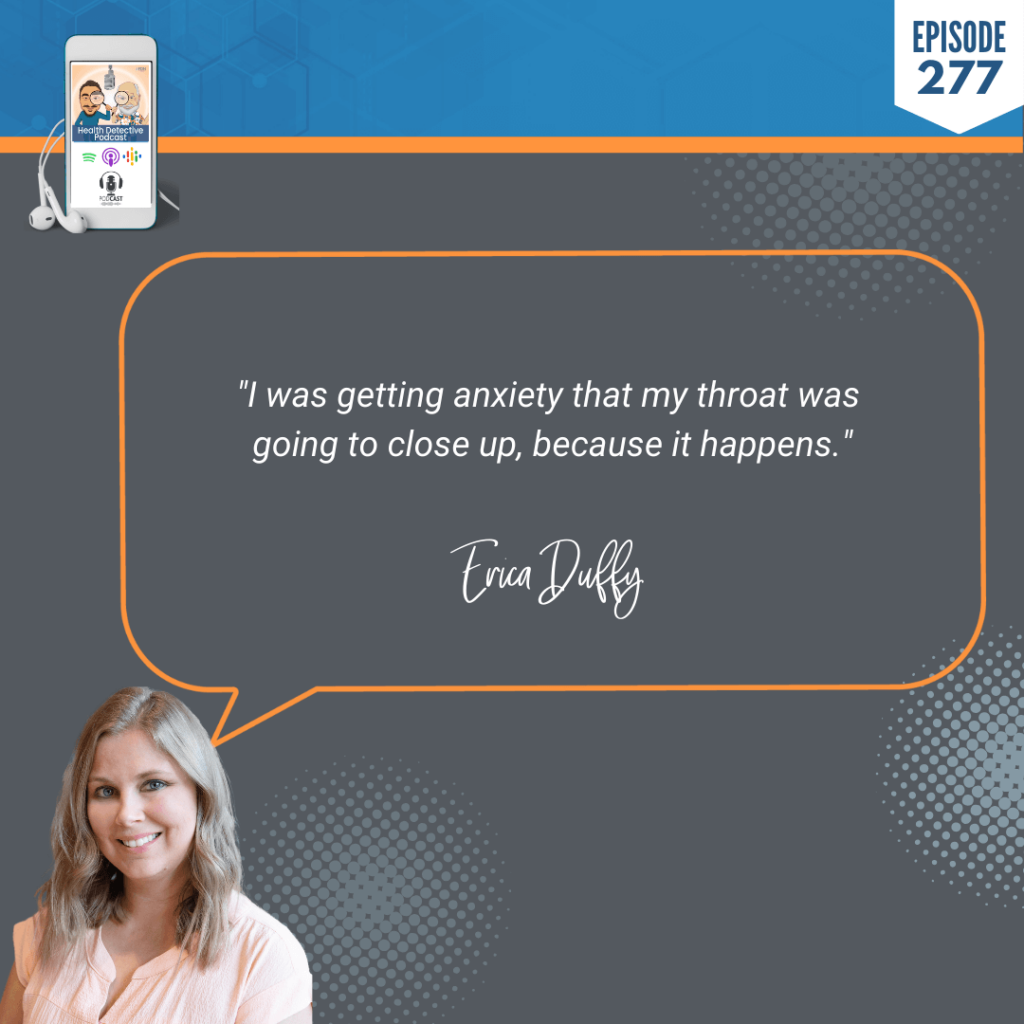
So, that Mother’s Day I spent in my bed. A lot of days I was just in my bed. I didn’t want to leave my house. Well, I had this big patch. I had hives all over, but there was a really big one on my neck right here. And I was getting anxiety that my throat was going to close up, because it happens.
So, I tried getting an EpiPen just to feel better, but they wouldn’t give me one. They said, no, you don’t need one. That won’t happen, like it can’t cause it. So, then I still was stuck. And I thought, I just can’t deal with this anymore. I feel for people who have chronic issues. I was only a couple months in before I started really getting into trying to figure out what was wrong.
Chronic Hives: Hashimoto’s
So, I’ve connected with someone, she’s had it for 15 years. I thought, how did you do this for 15 years?
It was just a couple months, and I joined a Facebook page. All of a sudden, I saw about functional medicine. And I thought, what? So, I tried to do some stuff on my own, change some supplements. Nothing was working. As we say, test don’t guess.
I found a functional medicine doctor. The first thing he did was a food sensitivities test. I’ve been a vegetarian since I was 11. And when my husband had the MS, we were looking at the Dr. McDougall protocol, which was mainly plant based, so he went vegan.
Now, I’m jumping ahead, but with FDN, the protein. I realized it might have been gluten and the dairy might have been the issue for him, so he’s since added meat back in. But he was afraid of being too restrictive. He didn’t want to restrict too many foods. So, then he took the test, and it took three weeks till my next appointment.
I didn’t want to sit and waste three weeks, so I did the restrictive diet on my own. I thought I’m doing this. It’s high histamine so I just left out high histamine foods. Then I was starting to get a little bit better. But I noticed my food sensitivities test wasn’t terrible. I eat spinach, tomatoes, avocado which is all high histamine anyways, so I was leaving it out.
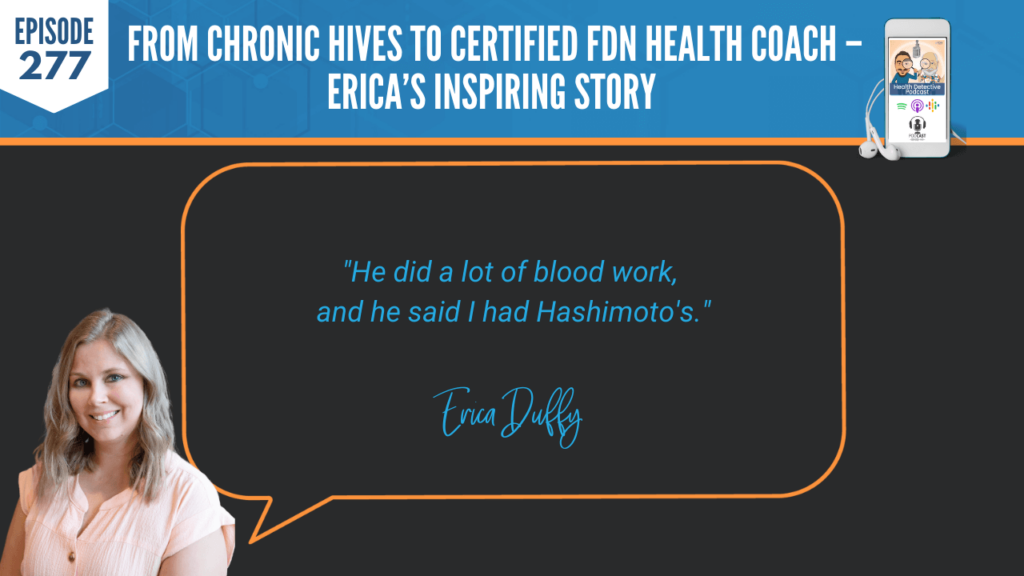
That’s the only test he did. He did a lot of blood work, and he said I had Hashimoto’s. Of course, now the conventional labs showed in the normal range, my thyroid. I was surprised with that, but the antibodies were very low.
Chronic Hives: Labs with FDN
So, they said, we’re going to leave out gluten. That’s when I went gluten free. She said, leave out gluten and we’ll see how it does with your antibodies. If it doesn’t get better, we’ll add gluten back in. But I felt so much better without it, I just still haven’t added it back in.
Then I was starting to heal, I was getting a lot better. I would not have as many, but I was still having them. So, then I came across a Facebook page with a lady who is a functional medicine practitioner. And I thought, you can do this. That’s something I can do. I was like, you mean to tell me I can run labs and help people? So, I found FDN.
I just thought, I want to try to finish healing myself, see what I can find more about myself, and then just thought this is where I want to be when I grow up. Yeah, I was sitting on that health coach certification, and I knew I wanted to help people, just didn’t know where to go, didn’t know what to do. So, it sparked an interest.
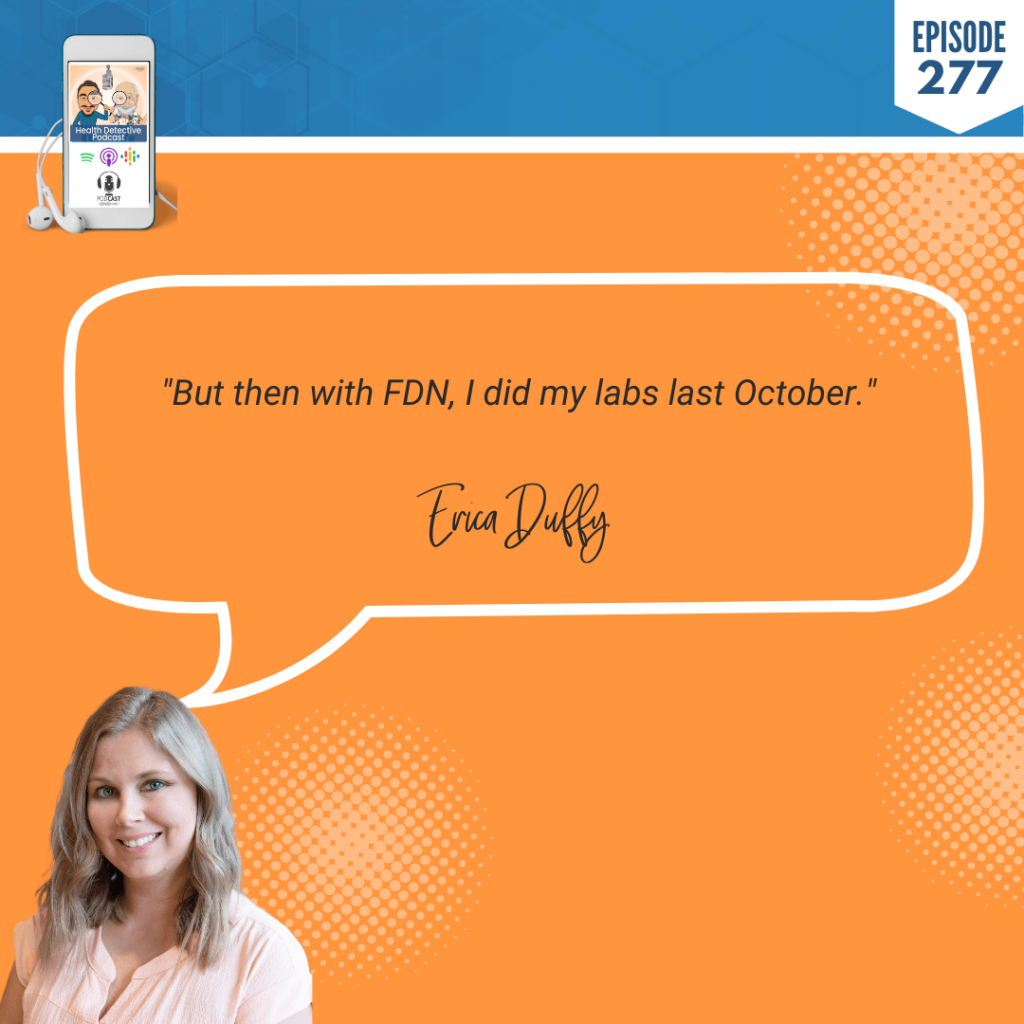
I still saw my functional medicine doctor; he was still helping me. He had me on different supplements. But then with FDN, I did my labs last October. I was still having my hives, but my CAS score was 29 at the time. My only complaint really was the hives and I’ve had some acne. And I still have some hormonal acne that I’m trying to work on, but I haven’t retested.
Chronic Hives: Unusually Unhealthy
So, I did my test in October. By the time I did my R&R, because it took me some time to get through the holidays and through the program, the hives were gone. She goes, this showed your high histamine. At the time, it was just really strange how it all worked out.
As I was doing FDN, I was making sure of my diet, stuff I’d always worked on. Even growing up, I grew up in a household where my dad was very into diet. I always had vegetables and fruit and a bedtime. He didn’t let me sleep in. And then I just followed through growing up.
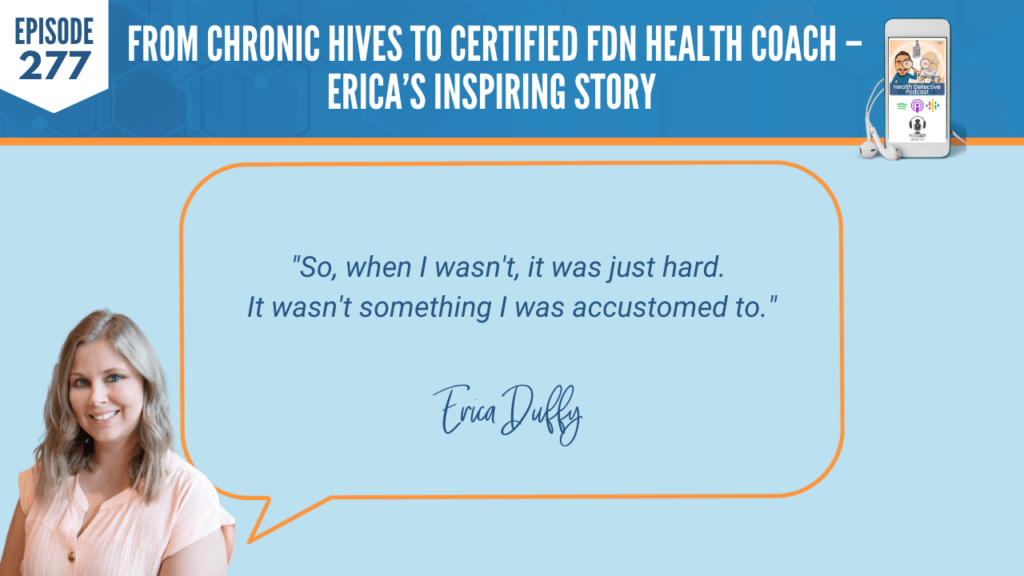
That’s why I think I’ve always been pretty healthy. So, when I wasn’t, it was just hard. It wasn’t something I was accustomed to. Because I’ve noticed, working with a couple of clients, they say five years it’s bothering them, or one was 10 years. And I just keep thinking, they think it’s normal.
[00:17:04] Detective Ev: I talk, obviously, to a ton of people, not only client wise, but here on this podcast. And I would say you’re right. It’s more of the norm that most of the people, at least on this podcast, which you could say is maybe a biased group because people are actually super passionate doing this as a career, but generally speaking, that is the norm where, it’s 10 years, 15 years of stuff going on before you really get an aha moment and figure these things out.
And I especially think the younger things start, the more we rationalize and normalize these things in our head. I’m always so thankful that I had these kinds of moments at 18, 19, where I finally, for whatever reason, just said, this doesn’t make sense.
Chronic Hives: Connecting the Dots
It was the first time after all those years that I’m like, something doesn’t add up here. I’m not a doctor, I don’t know anything about this right now, but I just don’t buy that I’m supposed to feel this way or have all these random things going on. So, that’s what I was going to ask.
You, in 2016, this all started happening. Before that, it’s not like you were living maybe an FDN perfect lifestyle but you would consider yourself someone, because of your upbringing, maybe more aware of some basic health stuff than the average American running around. Not that that’s saying much, unfortunately.
[00:18:10] Erica Duffy: Yeah. I’ve always been one for my sleep. I need my seven, eight hours of sleep at night. Cause I know how I feel if I don’t get it, so I’ve always been like that.
And then when my kids were younger, I was on the go a lot with them. At some point, maybe it was because of 2020, you had to slow down, I just realized, it’s not good for them either. Then they’re thinking you always have to be on the go, eat in the car, so we scaled back. Instead of them doing all these activities, they’re each doing maybe one or two.
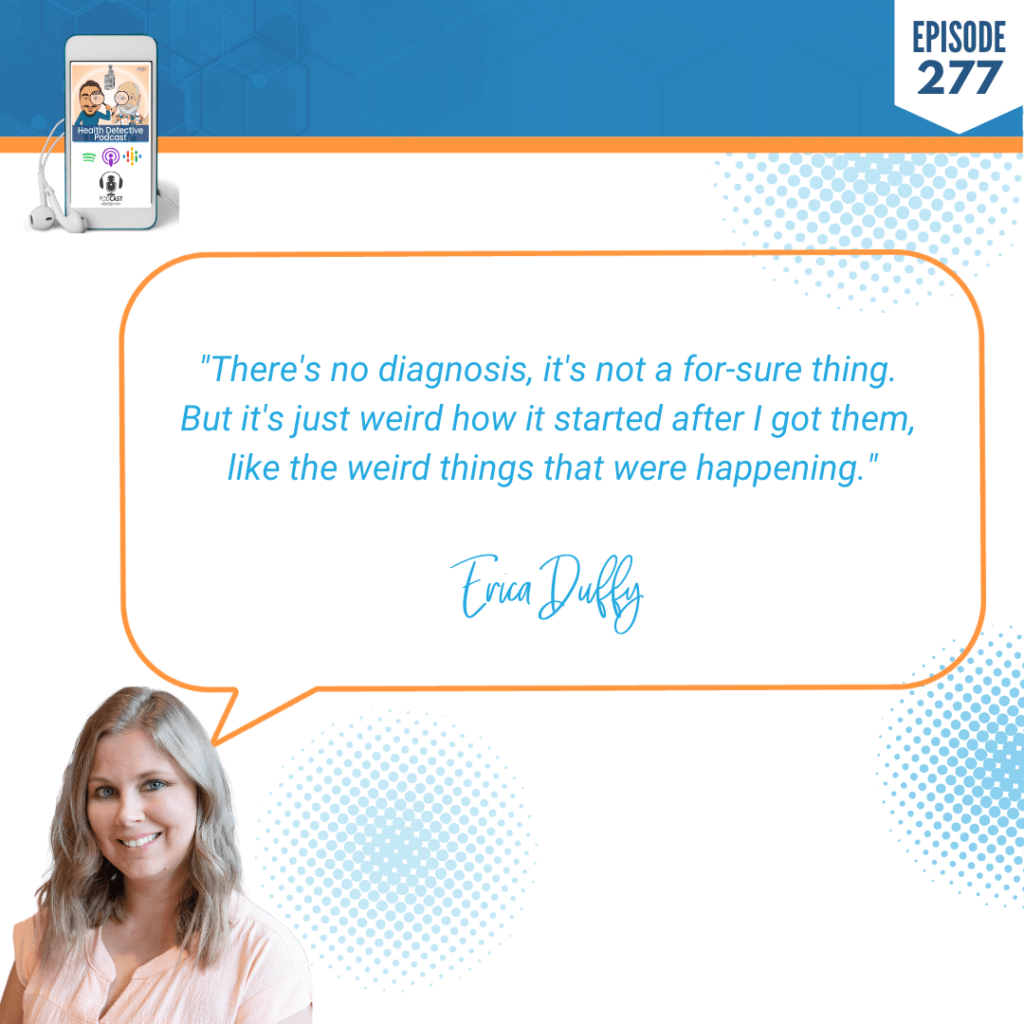
Growing up, that’s how I was too. I always did activities, but I never felt on the go. So, I think that’s why once I started having the issues, I was like, no this isn’t right. But it took me a lot of doctors to figure out, it was the implants. There’s no diagnosis, it’s not a for-sure thing. But it’s just weird how it started after I got them, like the weird things that were happening.
Chronic Hives: Medicinal Side Effects
Then those stopped, except for the hives. I don’t know, I still don’t know. And that’s what all the doctors told me. I saw an allergist too. He did an allergy test and he said, I hope I never see you again, but you probably will. And he said, you should take Xolair every two weeks, just a shot. He goes, you could take that, it’ll help you.
I thought, no, that’s still a band aid. It’s something that I wasn’t interested in. I said, I hope I never see you again either, nicely. He meant it nice. He’s like, I hope you continue to do well.
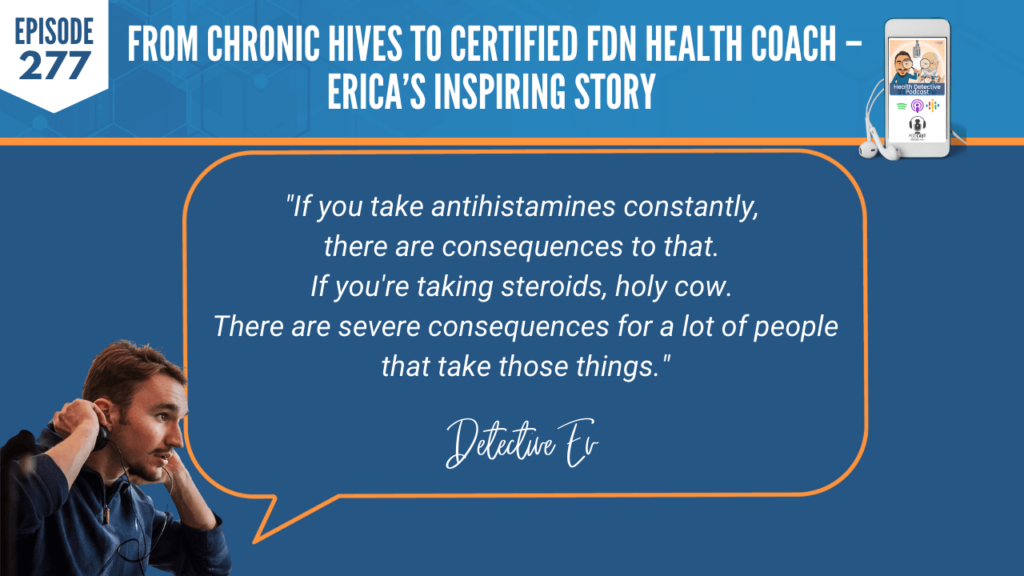
[00:19:44] Detective Ev: As always, not medical advice by any means, but when I hear these stories, especially with the allergic sensitive type reactions, the drugs, I don’t think people understand, these drugs are not particularly side effect free and they’re not free of long-term issues either. If you take antihistamines constantly, there are consequences to that. If you’re taking steroids, holy cow. There are severe consequences for a lot of people that take those things.
[00:20:10] Erica Duffy: Yeah. And then the Pepcid, I realized too, there’s consequences. I took that for three months straight.
The antihistamines, even though it wasn’t helping, I was taking it because I was having this anxiety thinking. What if I don’t take it? It could be worse. What if I don’t take it and my throat closes up? I hated that feeling so I was still taking them. Then they said, you could take up to four times the dosage on the pack, which I never did anything more than two. That actually made it worse, which was just strange how it was all working.
Chronic Hives: Pepcid
The allergist told me it’s just chronic urticaria, you don’t know what’s causing it. He said, there’s no food that can make it worse or better or lifestyle.
[00:20:51] Detective Ev: I have to ask this, forgive my ignorance, but what did the Pepcid have to do with a histamine thing? Maybe I don’t fully understand the drug.
[00:20:58] Erica Duffy: I don’t either. It’s weird. The emergency room doctor told me it’s a cocktail that usually helps. And I honestly didn’t look into it, I didn’t. I just was desperate. I’m like, okay, I’ll take it. And then the allergist said, yeah, keep taking that, that actually could help. But I have no idea.
[00:21:13] Detective Ev: You’re saying Pepcid, right? Like the stuff that’s normally used for acid reflux.
Erica Duffy: Yeah.
Detective Ev: Okay. I’ll look that up myself. At least I’m not totally far out cause I’m feeling ignorant. I’m like, what the heck? Why does that do something? I’m glad I asked because that’ll be interesting to see at least what their thought process or theory is behind that.

The only reason I even knew what that is, is because I would go into the hospital maybe once or twice a year for severe stomach pains, no appendix removal or anything. But they would give me that stuff. I went from 8, 9 out of 10 pain, we’re going to the hospital 3:00 in the morning, to 30 minutes later, it’s gone. So, I know that it can be used for those types of things. That’s really interesting that they used it for you as well.
So, you’re still in a sense on this journey. This is my favorite type of interview.
Chronic Hives: No Diagnosis but Tons of Anecdotes
You’re definitely over a lot of the main humps. I love that your husband’s doing so well, because that’s a serious diagnosis, obviously. But you guys are pushing right along, learning all these things and then sharing it with us along the way.
I didn’t say this when I first started talking again; I really have a huge respect because you’re not the first person to do it. There’s been like three or four total in the 270 something episodes. I really have a huge respect for the women that are coming on here talking about the breast implants and explants, getting them removed.
I can’t relate to this, I’m a man. But I would have to imagine that is not the most comfortable topic or like first thing you want to share. This is so important. Because by people not sharing it, there’s probably millions of women out there right now, or even tens of thousands would still be a lot, that are dealing with symptoms and have no idea that this is even a possibility. They’ve never even connected those dots.
And I guess in a certain sense I’m not thankful that you dealt with the symptoms, but I’m thankful that you were able to so easily connect it beforehand. When this happened, I started feeling this way. And this is what really being a health detective means in a sense.
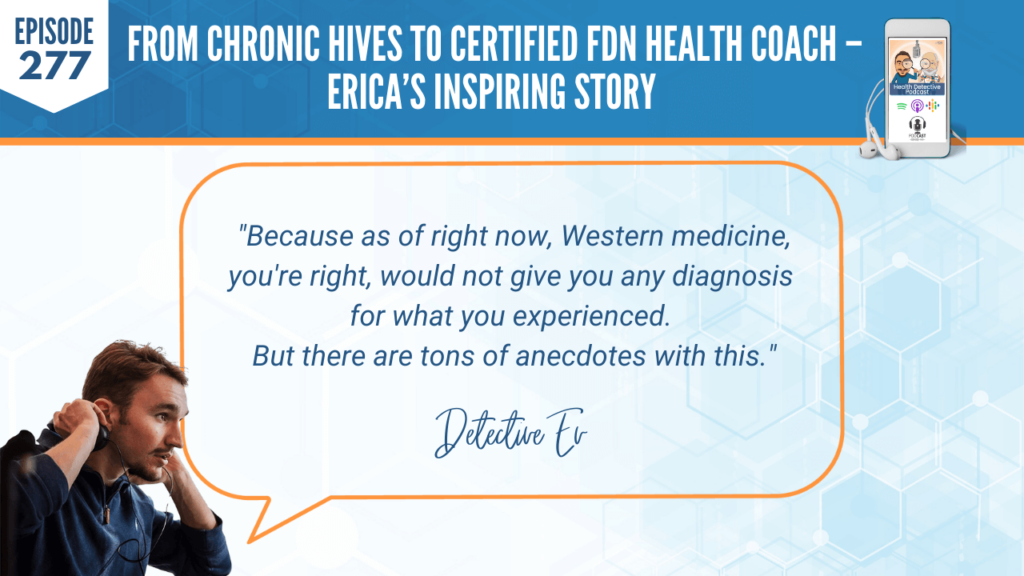
It’s not being smarter than a doctor or pretending that you have a degree, it’s nothing like that but it’s using some common sense. Because as of right now, Western medicine, you’re right, would not give you any diagnosis for what you experienced. But there are tons of anecdotes with this. Yes, that’s not peer reviewed science. I get it.
Chronic Hives: The Toxic Capsule
A lot of the best science comes from people first having anecdotal experiences. And then someone that’s a researcher wonders, huh, I wonder if we can study this. It always starts with the anecdotes or a completely random hypothesis. But most of the time it’s the anecdotes that lead to these studies being done. So, this is not the first time I’ve heard this. It’s very crazy to me that it can even trigger this.
And I guess there is an interesting part because that surgeon did acknowledge that by putting something foreign in, they expect a reaction. But what was it? They just expected something short term, right? Not over many years.
Erica Duffy: Yeah.
Detective Ev: Okay, so that’s the difference. We’re halfway there with Western medicine. They just don’t go all the way with it. Right?
[00:23:55] Erica Duffy: I saw my original surgeon because I was comfortable with him, so I wanted him to remove them. But he didn’t believe that it was the issue, which was fine. I just wanted them out. But he wasn’t going to remove the capsule.

So, a capsule forms around the implant. It’s your body just trying to protect the foreign object and the capsule still holds toxins. It was very important to get the capsule out too. There are many ladies who get them out but not the capsule and they still have their issues.
It’s not saying that maybe the implants weren’t the issue, but then they would get the capsule out and then would be able to heal. I went to a surgeon who believed in breast implant illness and was removing them. So, that was what he was doing.
Chronic Hives: Environmental Toxins
[00:24:41] Detective Ev: Good. So, there’s some people out here on the front line understanding that this actually does something to people.
[00:24:46] Erica Duffy: Yeah. There are.
Again, like I said, I know people who have them and they thankfully don’t have issues. But then I didn’t really jump into the genes much; I want to. There’s one called MTHFR; it’s you can’t properly detox. That’s why some people who have them maybe are detoxing the toxins okay.
Or your toxic bucket, I learned a lot about the toxic bucket with the hives. There are certain toxins you’re throwing in your bucket. And then for me, it just eventually tipped over. All this time I’d be buying Free and Clear products or things that said they were clean. But I learned when I had the hives that certain things weren’t because I would just get worse.
I know Pine Sol is not clean, but I loved to smell Pine Sol. And I mopped my floors one day and then all of a sudden, hives all over. So, I knew I can’t use Pine Sol anymore. Or I still drink, sometimes, Dunkin decaf coffee and it must be the mold or something in it. I would get these hives on my hands.
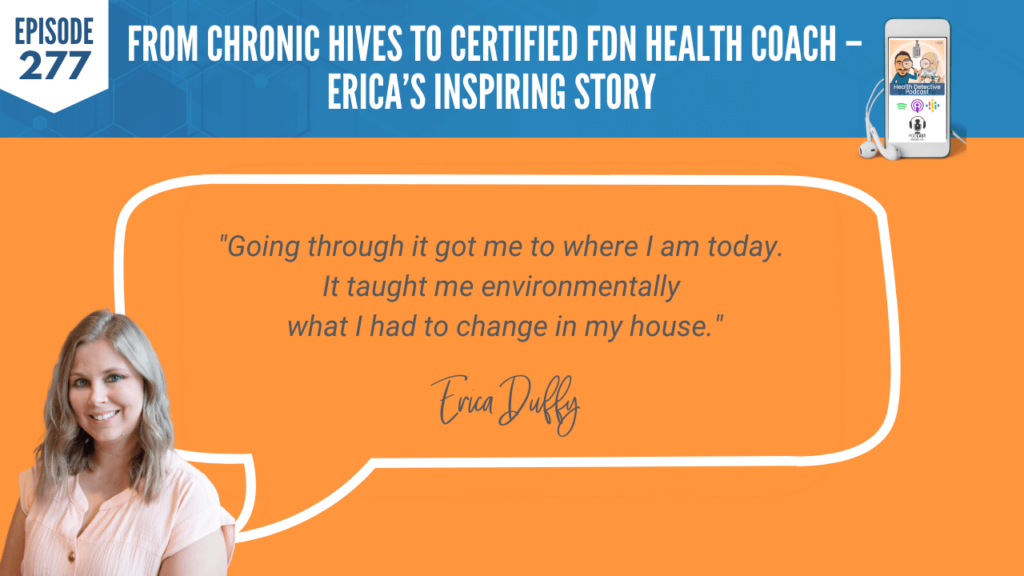
So, I’m grateful. Going through it got me to where I am today. It taught me environmentally what I had to change in my house. Or even lipstick. I barely wore makeup because it made it worse. But I went to my friend’s birthday and put lipstick on, and my lips just blew up like I had fillers.
Chronic Hives: Gratefulness
Then I talked to the functional medicine doctor, and she referred me to ewg.org to look into the toxins in my lipstick. Sure enough, I think it was at a toxic level of a seven and I had no idea. I didn’t know makeup could do that much. Or like shampoo. So, I just did a complete overhaul of everything. In my house now, too, I use certain laundry sheets now. I learned a lot from that too.

So, while you’re in it, while you’re dealing with your health issues, you might not see. Cause I always try to see the positive in a situation. But it’s hard to, sometimes, when you’re in it, see it right then and there. So, it took a few months. I’m like, okay, this is why I have to experience this. And then I can help other people.
[00:26:47] Detective Ev: I’m more of a spiritual person now, but there was a time during this health journey even on the positive end of the health journey that I wasn’t. So, there’s a personal preference. My point in mentioning that detail is obviously many people who are spiritual, religious, whatever you want to call it, totally believe everything happens for a reason. And then you have many secular atheist people who might not believe in that.
But the philosophy that someone proposed to me is, it doesn’t matter if you don’t believe in something else. What would happen if you acted like everything happened for a reason? Wouldn’t that change your thought process? I’m like, oh, that’s brilliant, right? Because just pretending actually still leads to a positive outcome without getting too woo-woo.
Chronic Hives: Fewer Incidents of Autoimmunity
If I look at the negative things that happen in my life and said, if hypothetically, this was to happen for a reason, what would someone who experienced this for a particular reason go out and do? It switches your mindset very positively into, look at the other things that maybe I’m preventing long term now that I’m more aware of my health.
Look at the fact that you’re probably able to help your husband way more because you’re into this stuff than you otherwise would have been. Not to mention the countless clients and sharing stories like this. Whether you’re spiritual or totally secular, it actually really doesn’t matter. Just acting like these things happen for a purpose makes total sense.
And what you mentioned about the chemicals on a side note, I think is super important. This is a theory, obviously, but I genuinely believe that the issues with the chemicals are one of the bigger reasons that women deal with seven times the rate of auto immunity.
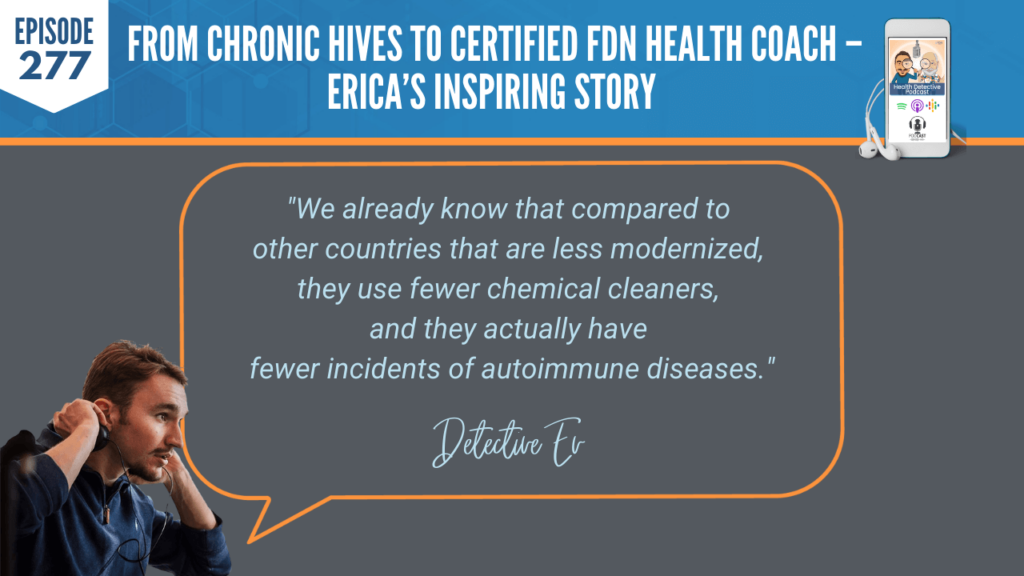
We already know that compared to other countries that are less modernized, they use fewer chemical cleaners, and they actually have fewer incidents of autoimmune diseases. But when we come to the United States of America, it’s literally like seven times more women deal with autoimmune diseases than men. And you could say misdiagnoses cause men are stupid and don’t go in as much.
But we also know that women don’t get represented as much when they go to the doctor and talk about something. This is true. They’re more likely to be told that it’s in their head than a guy is.
Chronic Hives: Men Versus Women
But I think a lot of these societal standards that we’ve created, and this isn’t like a political thing, I’m not someone that complains about the societal standards imposed on men and women. But I think it’s very practical to say there’s an expectation for women to use way more products, like you said, the makeups, the lipsticks and stuff than men.
Worse yet, if we go back even farther, there’s a total stereotype that is being deleted right now because of the requirement for most people to have two income households. But historically speaking, women, for better or for worse, would have been more of the people taking care of the house while the man might have been working. Obviously, that’s like a thing of the past now. Many women are still working and doing all that stuff, doing like 3x what they normally would have done. My point is, I think they’re more active with those chemicals.
If I look at my dad, landscaping, Greg, he’s out touching dirt and doing all this kind of stuff. And his apple at lunch would fall. I remember this when I was a kid, I was working with him the one day. His apple would fall on the ground, I thought it was the dirtiest thing in the world. Knowing what I know now, it’s so smart to do this. He’ll pick it right up and eat it.

Versus my mom, when she’s working at the restaurant or working at home, Pine Sol, just like you said, loves that. Lysol. She’s using Clorox, all these different things. I’ve had to eliminate a lot of that stuff in my life.
Chronic Hives: The Chemical Storm
People hate this, but I swear, no one’s ever told me that I smell yet, so either they’re very polite or it’s working. Like, when I use my washer and dryer, most of the times, unless we like really tainted the clothes by going hiking or something, I just use the heavy duty setting with water. The clothes come out and they smell fine.
Dishwasher, same thing. I just put it on heavy duty, and we just use water a lot of the time. There’s 5%, 10% of the time it doesn’t work as well as you want it to. But 90%, I’m like the whole point of the dishwasher is to wash the dishes. I don’t think it like requires a certain thing for it to automatically work. And it’s amazing how well these things do work if you just eliminate them.
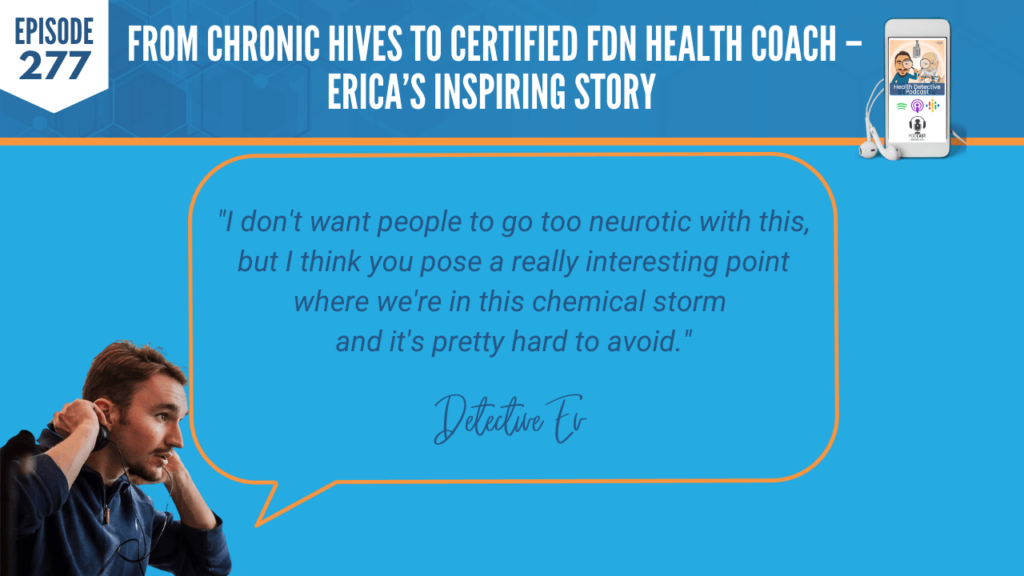
I don’t want people to go too neurotic with this, but I think you pose a really interesting point where we’re in this chemical storm and it’s pretty hard to avoid. And it can be anything that triggers these things, sometimes something very benign and sometimes something more daily. The benign, I guess, would be the lipstick. You’d think that shouldn’t do anything. And then if something harsher like a Pine Sol, we know it’s bad, but we keep doing it.
So, what are the practical solutions for people? You mentioned that you use certain brands. Are there recommendations for things that you like more than not?
[00:31:01] Erica Duffy: Clean People is a good one. And then makeup wise, I’ve changed to Honest Beauty, but this was before FDN. Now I want to try Beauty Counter. There are different ones I want to try. I’m just very basic though.
Chronic Hives: Educating the Next Generation
That’s how I grew up too. So, I think maybe I didn’t use a lot of chemicals growing up. I just always had shampoo, conditioner, and a body wash. And I barely wore makeup growing up. My mom was very basic. I didn’t really use perfume.
With my daughters, I’m trying. It’s hard with the social media. They’re just influenced easily. They want this and they want that. And they’re starting younger. My 11-year-old is my youngest, but she sees my 17-year-old using things. And I’m just trying to educate them. I’m trying to change it over and say, if I’m going to buy it for you, it’s going to be something.

The problem is, when they have birthdays or something and friends buy them things, they use them. But I’m really trying to educate them on it because I know they’re endocrine disruptors. And that’s one thing too, like I mentioned with the toxic bucket. Like for me, I get my nails done. That’s one thing I do. I do go for the nontoxic. But being in there, there’s something they might use that’s not completely nontoxic.
I’m not saying wipe out everything because that’s hard, right? There are certain things, changes you can make or just pick and choose what you want to. Some people get their hair dyed. I haven’t gotten my hair dyed maybe in seven years. That’s just something I stopped a while ago. Who knows, maybe one day I’ll start dying my hair and add that in. Like you said, you can’t completely. It’s just now, I could probably use Pine Sol again. I know I can drink Dunkin coffee again.
Chronic Hives: Picking our Stressors
So, I think I pretty much had leaky gut and I peeled it. Now my body can handle it again. But I just choose not to because I don’t know how I’m filling my bucket. I’m choosing how I’m filling it and what I’m filling it with.
[00:32:51] Detective Ev: I love the bucket analogy. It’s not how I word it, but it’s the same thing where we got to pick our stressors. Because what happens in this space, I’m fully a victim of this myself, so I’m preaching to the choir.
It’s a thing where when you’re really sick and you start making all these changes at once because you’re dedicated to feeling better, you’ll do whatever it takes. It can create a kind of neuroticism around, I got to keep everything clean a hundred percent of the time and be safe and never see an EMF again or be around one. It’s okay, whoa, holy cow. Humans would not have gotten as far as we did if we weren’t resilient. And resiliency implies that we can handle some level of stress.
I thought it was fascinating recently, my fiancé and I left the country for the first time. We went to Italy. Italy has the third longest life expectancy in the world right now and 25 percent of the population smokes. Now, no one would advocate that. And correlations, not causation, right?
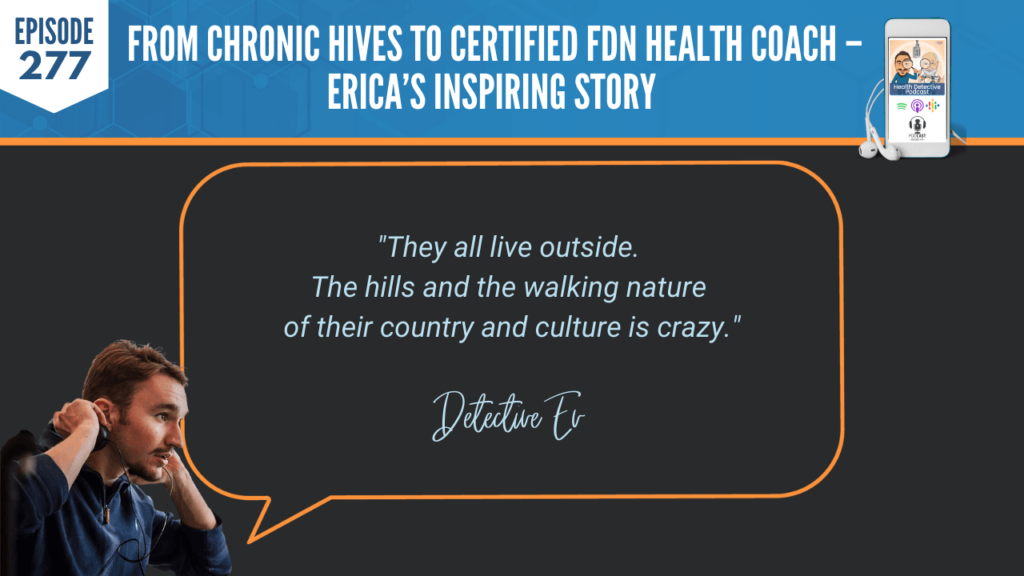
But one has to wonder, okay, what’s going on there? It’s not that smoking is good. That’s not what I’m suggesting whatsoever. It’s that you find, look at how tan these people are. They all live outside. The hills and the walking nature of their country and culture is crazy.
Chronic Hives: Balancing Stressors
It’s almost as if you can balance the stressors a little bit. And you have to figure out what the major ones are for you. For me, the gluten thing, I’m never touching it, not consciously or purposely at least. I will avoid that as much as I can for the rest of my life. I have never purposely eaten it since I found out that I was sensitive. It hits me too hard; it feels too bad.
But then there’s other foods and other things that I’m like, does this mean I can never stay up late for one night again? Does this mean I can never have dairy again? Those are my things that I can play around with a little bit.

We’re going to a wedding this weekend for two best friends. Honestly, Erica, like literally three or four years ago, I wouldn’t have even stayed up past 10:00 PM. I would’ve been like, hey guys, I’m leaving. Sorry. I’m going to enjoy my time this weekend and stay up with my friends because it’s once a fricking year, who cares? So, we learn to balance these things a little better.
You have a bunch of comments here, which was great. So, I’ll fly through some of these really quick. Someone said, “yeah, gluten can be a really big problem for many.” Very true. Shelby said, “Erica, my husband has MS as well, and this is one reason I have joined FDN.” Awesome, Shelby. We would love to have you on the podcast eventually, but definitely hope that this all works out well.
Does your husband follow the same protocols? Like he reintroduced meat, sure. But is he doing kind of the FDN lifestyle?
Chronic Hives: Working on D.R.E.S.S.
[00:35:08] Erica Duffy: We’re working on it. I mainly do the cooking, so he is diet wise.
We’re trying with rest. I haven’t done the protocols on him yet. And I told him, I have a feeling, just, again, test don’t guess. So, I’m not going to do any protocols, but I feel like he might have parasites or mold. I told him I need to do these. He just hasn’t yet. We try to sleep like 10:00 pm to 6:30 am, usually, sometimes 10:30 pm to 6:00 am.
Now, like you said, you go out, I do socialize. I went out for my friend’s birthday a few weeks ago. So, I was probably out till midnight, which is late for me, but I had a fun time. It’s good to have that connection too.
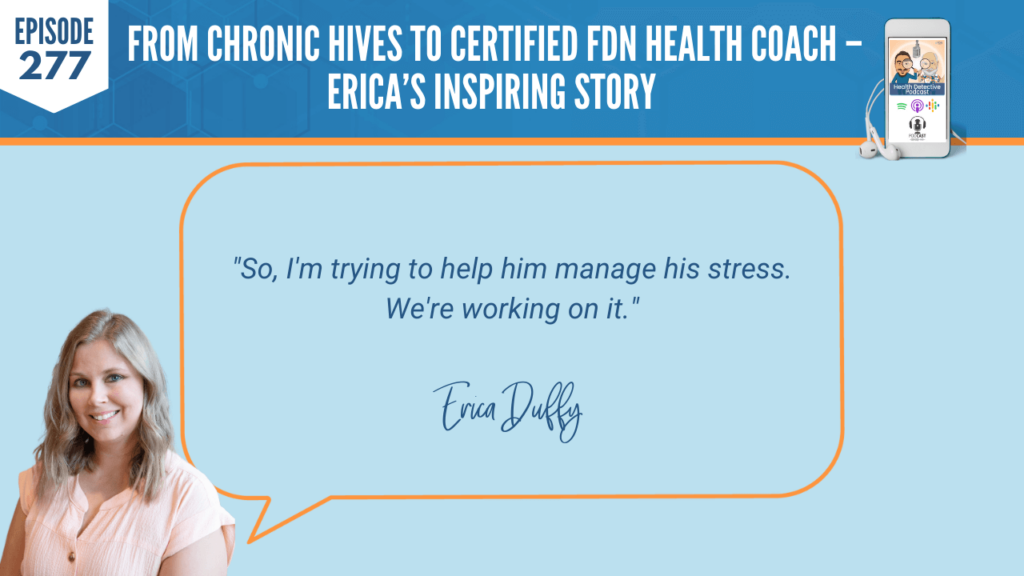
He’ll stay up late sometimes if we go out. For the most part, he’s sleeping. He doesn’t have a lot of time. I make sure he gets walks in every day with me, but he’s working a lot. So, I’m trying to help him manage his stress. We’re working on it.
[00:36:04] Detective Ev: I think it’s more experienced with this. I know this sounds funny, but I really do mean this. Work for me is that stressor that I just love. Because I’m doing stuff like this all the time. It’s fun.
But I realized if I keep the other stuff really in check, that can afford me working most of the day, what some people would consider work. I don’t really look at it the same way, but I do know it takes a toll, right? It’s not something that you can just do forever and stay up all night. It doesn’t work like that.
Chronic Hives: Client Success Story
So, I think it’s even something that can be balanced for many people too. But yeah, it’s all a tradeoff. Find out what you love, what’s worth it. For the Italians, 25 percent of them, it’s smoking, right? They’re not going to give that up, but they’re walking all day, getting in the sun. So, that’s great.
When did you graduate FDN? Because you mentioned that you’ve taken some clients already. How’s that going?
[00:36:43] Erica Duffy: I graduated in April and then I did business school after. And then the kids, by the time I finished business school, they were off for the summer. So, I got a couple of clients in June. Then I didn’t really start until August, I started really trying.
[00:36:59] Detective Ev: Excellent. With those clients that you started with in June, I know it’s been a few months depending on where the person’s coming at in their journey or coming to you at in their journey. They can be profound. It can be, we’re making progress. But I’m just curious. I like to ask for some types of testimonials if they’re relevant. Have you had any things with these clients yet that it’s going really well, we’re moving the needle. What’s been going on there?

[00:37:21] Erica Duffy: Actually, yes. I got her follow up form yesterday. I’m meeting with her next week, but she filled out the form already. Her sleep is, from 0 to 10, it’s at a 10. And her energy’s at a 10. She just feels great, she’s out and about doing really well. So, she still has some things we’re working on, but overall, she has her energy and is sleeping really good.
Chronic Hives: A Blessing in Disguise
[00:37:46] Detective Ev: It’s really hard to do the rest of this stuff without the energy. Those initial phases, that’s not a small detail, right? Like when you have the energy, you can do almost anything.
What always happens for a lot of us in the beginning of these journeys is your energy is so low, you’re so foggy all the time. It’s hard to keep things moving. That’s amazing. I’m excited to see what happens and how this all progresses.
I’m getting a little ahead, but whether it’s six months or one year down the road, I’d love to hear about the business, how it’s going with the clients. I definitely would love to hear about the stuff with your husband as well. I guess I’m thankful in a sense that, it sounds like he’s obviously willing to make changes, but not going to do the full thing yet.
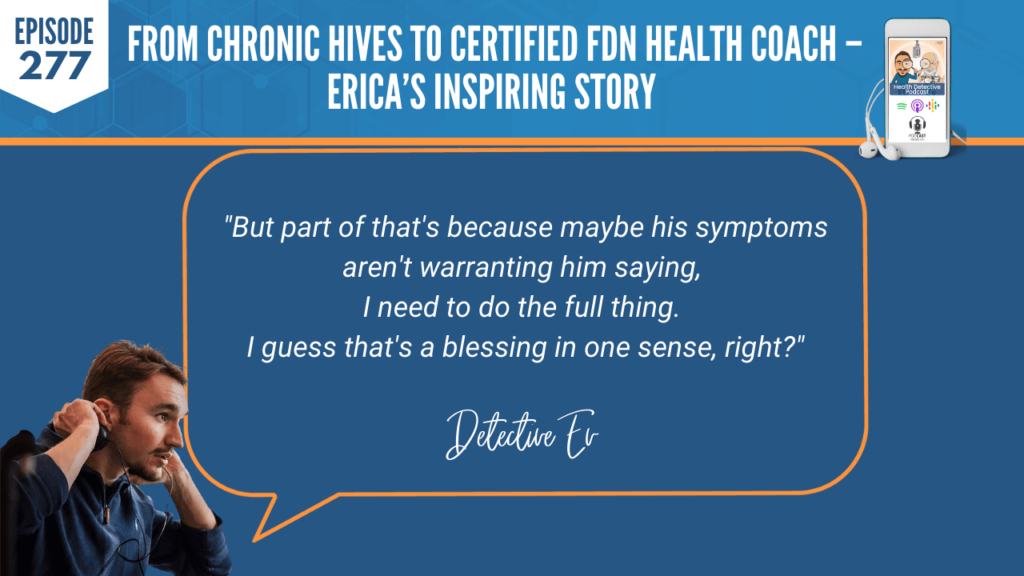
But part of that’s because maybe his symptoms aren’t warranting him saying, I need to do the full thing. I guess that’s a blessing in one sense, right? Cause MS can get pretty serious. So, the fact that it’s managed right now, and it’s really only those high stress days that lead to some symptoms, that’s fantastic.
Shelby’s still with us and said, “yes, parasites is big with MSers.” That’s funny, right? We can call people MSers now.
But, yeah, that’d be interesting to see what comes up for his stuff. Please let us know.
Okay. As we approach the final minutes here, one thing I obviously want to ask if someone resonated with your story. Because everyone’s unique, right? And actually, not many people have come on this before with the chronic hives thing.
Where to Find Erica Duffy
So, if someone’s listening to you today, and for whatever reason, whether it’s your personality story, combination of both, it’s like, all right, Erica’s my person. I like her. Where can people find you if they’d want to reach out?
[00:39:12] Erica Duffy: On Instagram, I’m at ericaduffywellness. And on Facebook, I’m at ericaduffywellness. Then my website is ericaduffywellness.com.

[00:39:19] Detective Ev: Nice and easy.
Oh, someone shared the ewg.org. So, you guys have that right here. Excellent.
Erica, for the final question today, we have a signature question on this podcast. I always end with it. And it’s just to the best of the ability that you’re able to answer it. If we could give you a magic wand and knowing what you know now, you could get every single person in this world to either start doing one thing for their health, or you can get all of us to stop doing one thing for their health what’s the one thing that you’d get all of us to do?
Signature Podcast Question
[00:39:53] Erica Duffy: There’s a two-part answer because I would say, don’t sit on your health. If you feel fine, if you’re moving along fine, don’t wait for something to happen until you work on your health. Because you might be listening and might not be realizing. Some people are in a chronic state for so long and they don’t realize cause they’re just going along. They might not realize something’s wrong.
Also, if you’re getting symptoms, don’t sit on them. It’s your body trying to tell you something’s wrong. Get it checked out with probably a functional practitioner, I would say. It’s not normal to have bloating and fatigue. You don’t have to live like that.

So, that’s what I would say is to either don’t wait for a symptom to happen, or if the symptoms do happen, get on them.
[00:40:38] Detective Ev: I think, yeah, the second one’s probably more realistic. You’re totally right. But the second one’s more realistic.
Of all the people in my life, as much as I talk about this, as much as you can’t ignore me, I’m annoying as heck with it, post about it all the time, bring it up at the family parties when everyone’s trying to enjoy Thanksgiving dessert, there’s been maybe two or three people I’ve known in the last nine years that have forward thinking enough to test themselves while they were perfectly healthy, felt amazing.
Thankfully though, I think that’s why your second option is very realistic. By us sharing messages like this and becoming practitioners and letting people in our life know what’s going on, I am finding that many people in my life become a lot more aware and proactive of this with otherwise minor symptoms.
Conclusion
Bloating in and of itself is not going to kill you. So, if you start getting on top of it then, you got a probably pretty straightforward healing journey, not always, but probably pretty straightforward healing journey. So, if nothing else, if you’re super smart and forward thinking, my gosh, do them today.
But at the very least, you start getting those symptoms, have that awareness like you did. You knew something was off. It just doesn’t make sense. I got to change something. Thank you. I think that’s great words of wisdom to end on.
And yeah, that’s about it. So, thank you so much for coming on today and being our guest.
[00:41:48] Erica Duffy: Thank you. Thank you for having me.
You can always visit us at functionaldiagnosticnutrition.com, on YouTube @FDNtraining, on Instagram @fdntraining, or on Facebook @FunctionalDiagnosticNutrition.
For more informational and functional health-oriented podcasts like this one, go to functionaldiagnosticnutrition.com/health-detective-podcast/.
To learn more about us, go to functionaldiagnosticnutrition.com/about-fdn-functional-testing/.







